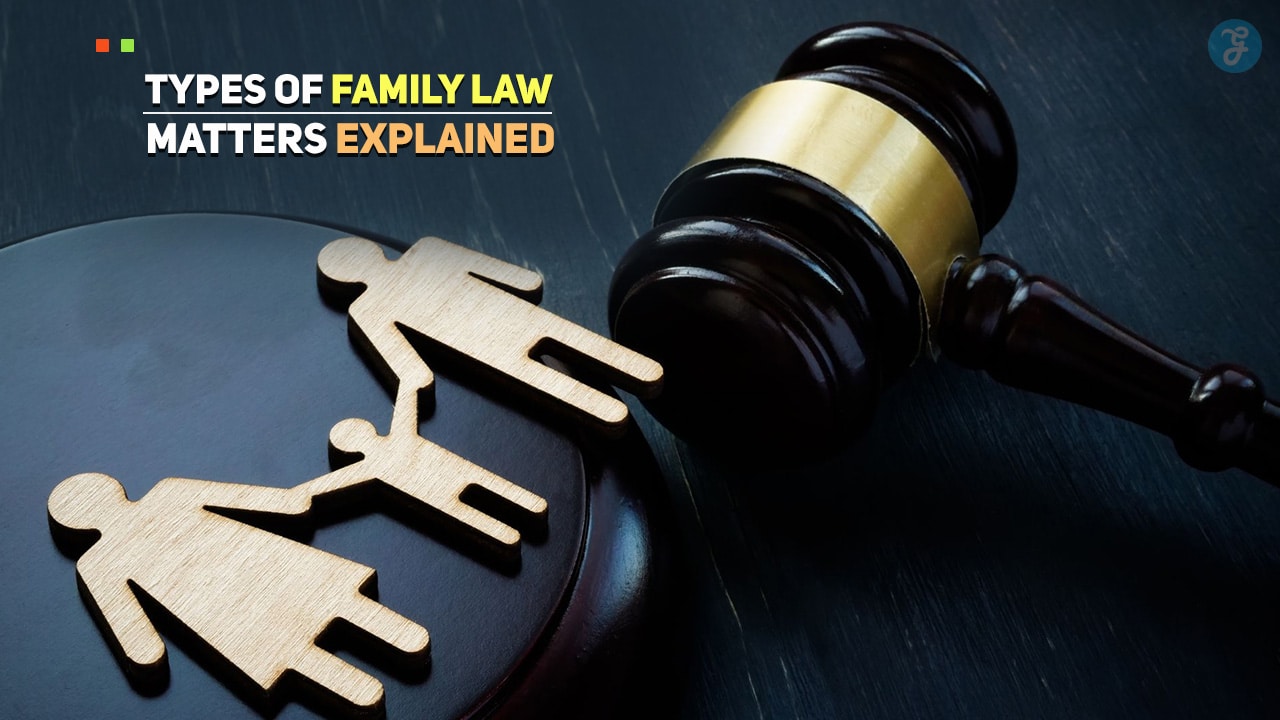Family law is a branch of legal practice that focuses on issues involving familial relationships.
These matters often come with emotional and legal complexities, requiring careful navigation to protect the rights and well-being of all parties involved.
In this comprehensive guide, we’ll explore 6 types of family law matters, breaking down what each entails, when they apply, and why they’re significant. Whether you’re dealing with divorce, child custody, or other family-related issues, understanding these legal matters can help you make informed decisions and secure the best outcomes for your family.
1. Divorce and Separation
Divorce and separation are among the most common family law matters. When a marriage or domestic partnership ends, the legal process ensures that all financial, property, and child-related matters are resolved fairly.
Key Aspects of Divorce Law:
- Grounds for Divorce: Laws vary by jurisdiction but often include no-fault grounds, such as irreconcilable differences, or fault grounds like adultery or abuse.
- Division of Property: This includes dividing marital assets and debts according to community property or equitable distribution laws, depending on the state.
- Spousal Support (Alimony): Determined based on factors like income disparity, length of the marriage, and each party’s needs.
Legal Separation:
Unlike divorce, legal separation allows couples to live apart while remaining legally married. This option is often chosen for religious, financial, or personal reasons.
Why It Matters:
Divorce and separation cases require careful handling to ensure that all financial and emotional concerns are addressed. An experienced family law attorney can help protect your interests and facilitate smoother proceedings.
2. Child Custody and Visitation
Child custody and visitation rights are crucial components of family law, focusing on ensuring the well-being of children during and after a parental separation or divorce.
Types of Custody:
- Physical Custody: Determines where the child lives. It can be sole or joint.
- Legal Custody: Refers to decision-making authority over the child’s education, health, and welfare.
Visitation Rights:
Non-custodial parents often receive visitation rights, allowing them regular, meaningful time with their children. Courts prioritize the child’s best interests when determining custody and visitation arrangements.
Factors Courts Consider:
- The child’s age and health.
- Parental ability to provide a stable environment.
- The child’s preference (in certain cases).
Why It Matters:
Child custody disputes can be emotionally charged. Legal representation ensures that arrangements are fair and prioritize the child’s well-being while protecting parental rights.
3. Child Support
Child support laws ensure that children receive financial support from both parents, regardless of their marital status. These payments help cover the child’s basic needs, such as food, housing, healthcare, and education.
How It’s Determined:
- Income-Based Calculations: Courts typically calculate child support based on the income of both parents and the needs of the child.
- Custody Arrangements: The parent with primary custody often receives support from the non-custodial parent.
- Adjustments: Child support orders can be modified if circumstances change, such as job loss or increased medical expenses.
Enforcement:
Failure to pay child support can result in legal penalties, including wage garnishment, fines, or even imprisonment in severe cases.
Why It Matters:
Child support ensures that children maintain a standard of living consistent with their parents’ financial capacity, providing stability and security.
4. Adoption
Adoption is a joyful but legally intricate process that establishes a permanent parent-child relationship between individuals who are not biologically related. Family law governs both domestic and international adoptions, ensuring they adhere to legal requirements and prioritize the child’s best interests.
Types of Adoption:
- Agency Adoption: Conducted through licensed adoption agencies.
- Private Adoption: Arranged directly between birth and adoptive parents, often with legal assistance.
- Stepparent Adoption: A stepparent legally adopts their spouse’s child, often simplifying the process.
- International Adoption: Involves adopting a child from another country, requiring compliance with international laws like the Hague Convention.
Legal Requirements:
Adoption typically involves background checks, home studies, and court approval to finalize the process.
Why It Matters:
Adoption laws ensure that the child is placed in a safe, loving environment while protecting the rights of all parties involved, including birth parents and adoptive parents.
5. Domestic Violence and Restraining Orders
Domestic violence cases fall under family law and involve addressing abuse within familial or intimate relationships. Legal protection is available for victims through restraining orders and other interventions.
Types of Domestic Violence:
- Physical Abuse: Inflicting bodily harm or injury.
- Emotional Abuse: Controlling, threatening, or manipulating behavior.
- Financial Abuse: Controlling a partner’s access to financial resources.
Legal Remedies:
- Restraining Orders: Court-issued orders that prohibit the abuser from contacting or approaching the victim.
- Custody Modifications: Adjusting custody arrangements to protect the child.
- Emergency Support: Temporary housing and financial assistance for victims.
Why It Matters:
Domestic violence cases require immediate legal action to ensure the safety and well-being of victims and their families. Legal representation helps victims navigate the process and access critical resources.
6. Guardianship
Guardianship involves appointing a person to care for a minor or an adult who cannot care for themselves due to age, disability, or other factors. Family law governs the appointment process and ensures the guardian acts in the best interest of the individual.
Types of Guardianship:
- Guardianship of a Minor: Appointed when parents are unable or unwilling to care for their child.
- Guardianship of an Adult: Often applies to elderly individuals or those with disabilities who need assistance managing their affairs.
Legal Responsibilities of Guardians:
- Providing for the individual’s basic needs.
- Managing finances and medical care.
- Making educational or professional decisions.
Why It Matters:
Guardianship laws protect vulnerable individuals, ensuring they receive the care and support they need. Proper legal guidance is essential to navigate the complex process.
Conclusion
Family law encompasses a wide range of matters, each aimed at protecting the rights and well-being of individuals within a family unit.
From divorce and custody disputes to adoption and domestic violence cases, understanding these legal issues is critical to making informed decisions for yourself and your loved ones.
By seeking knowledgeable legal counsel and staying informed, you can navigate the complexities of family law with confidence.
Whether you’re facing a challenging situation or planning for a brighter future, these 6 types of family law matters highlight the importance of protecting your family’s interests.




































